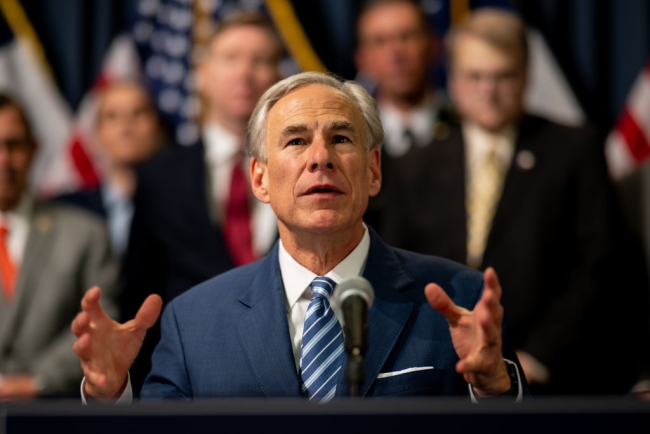You have /5 articles left.
Sign up for a free account or log in.

Greg Abbott, Texas’s Republican governor, signed Senate Bill 17 into law last month.
In multiple states where Republicans targeted tenure and diversity, equity and inclusion this year, tenure survived while DEI was curtailed.
That doesn’t mean tenure is safe. It’s been eroded for decades, including through posttenure-review policies that higher education leaders enact outside of statehouses, and by institutions offering fewer tenured positions.
The American Association of University Professors says 68 percent of U.S. faculty members held contingent appointments in fall 2021, compared to about 47 percent in 1987.
“It’s not like we’ve seen this constant decrease in the number of institutions with a tenure system,” said Glenn Colby, senior researcher at AAUP. “It’s more that the institutions are relying more and more on faculty working contingent positions and graduate assistants and so forth.”
Colby noted that his own reports might understate tenure’s decline by, for instance, considering Georgia public universities to still have tenure despite the University System of Georgia’s controversial posttenure-review policy. On the other hand, many institutions are improving employment conditions for those in contingent roles, including through multiyear contracts, he said.
Tenure’s defenders can include seemingly strange bedfellows.
It protects researchers whose discoveries anger industry, and aid it. It protects minority and white professors. And it protects liberal and conservative scholars.
“Let’s face it: Tenure has protected conservative faculty across the country, who are dwindling in numbers,” said Joe Cohn, legislative and policy director for the Foundation for Individual Rights and Expression. “And it’s really hard to see how getting rid of tenure improves the hand of those faculty members whose politics doesn’t jibe with their administration’s.”
On DEI, Cohn said FIRE favored some bills and opposed others. He noted there were important distinctions among them.
“We have been supportive of those that looked to dealing with how DEI was being used as a political litmus test in hiring, firing and promotion, and to forbid that type of activity,” Cohn said. “But we have been on the front lines opposing efforts to ban ideas from classrooms.”
He said, “Academic freedom requires that all ideas get to compete in the marketplace, and that those in power don’t put their thumb on the scales to prevent the views that they don’t like.”
Knowing exactly why tenure and DEI fates’ diverged would require reading the minds of hundreds of legislators across the country. For political reasons, lawmakers may introduce bills they don’t actually intend to push to passage.
Also, legislation that didn’t pass so far this year may simply re-emerge when lawmakers reconvene.
“Mark my word, SB 83 will be back in the fall,” Tom Young, chair of Ohio’s House Higher Education Committee, said of that state’s headline-grabbing bill. Versions of it would’ve affected both posttenure review and DEI, but the legislation didn’t pass.
Regardless, the divergent trend, if not the reasons for it, was clear this year.
Texas and Florida
In Texas, Senate Bill 18 would’ve ended tenure in public colleges and universities going forward. But, before it passed, the state’s House of Representatives drastically changed the legislation so that it alters but preserves tenure.
Yet the same Republican-controlled Legislature passed, and Governor Greg Abbott signed, Senate Bill 17. It’s a sweeping ban on public college and university DEI programming taking effect in 2024.
Across the now majority-minority state, the law will ban race- and sex-based affirmative action in institutions’ hiring as well as “trainings, programs or activities designed or implemented in reference to race, color, ethnicity, gender identity or sexual orientation.”
Those activities can take place “for the sole purpose of ensuring compliance” with court orders and state and federal law. But, even then, they must be developed by an attorney and signed off on by the Texas Higher Education Coordinating Board.
In Florida, Ron DeSantis, the governor and Republican presidential contender, signed Senate Bill 266, a wide-ranging law that affects public college and university employment as well as DEI.
The new law demands a posttenure-review policy for public institutions, though the State University System of Florida already had one.
It also says faculty tenure, firing and other personnel decisions can’t be arbitrated.
“I can’t announce anything right now, but you should not be surprised to hear of a lawsuit on that front in the very near future” said Andrew Gothard, president of the United Faculty of Florida union, regarding the arbitration limitation.
But Gothard said House Bill 999, the companion bill to SB 266, “was substantially worse” and early versions of both would’ve allowed posttenure reviews generally anytime.
“We were able to beat that back,” he said.
The law furthers tenure in another provision: it orders the University of Florida’s president to “ensure a pathway to tenure for faculty” of the Hamilton Center for Classical and Civic Education—one of three conservative-coded centers at different universities.
The Florida legislation hit DEI much harder.
“This bill says the whole experiment with DEI is coming to an end in the state of Florida,” DeSantis said at a bill signing. “We are eliminating the DEI programs. We’re going to treat people as individuals; we’re not going to treat people as members of groups.”
The law bans Florida public colleges and universities from spending state or federal money on activities that “advocate for diversity, equity and inclusion, or promote or engage in political or social activism.”
Exempted would be activities required for legal compliance, accreditation or access programs for certain student categories. Those categories include veterans, low-income, first-generation and “nontraditional” students, but not minority or LGBTQ+ students.
Gothard noted the law doesn’t define what DEI means.
“There’s going to be a lot of confusion as institutions try to figure this out,” he said.
The legislation goes on to overhaul required statewide core courses. It says general education courses can’t “include a curriculum that teaches identity politics … or is based on theories that systemic racism, sexism, oppression and privilege are inherent in the institutions of the United States and were created to maintain social, political and economic inequities.”
North Dakota and North Carolina
In North Dakota, the Republican-dominated State Senate narrowly rejected House Bill 1446, which would’ve let the presidents of two state institutions review and then fire tenured faculty members—without review from, or the right to appeal to, a faculty committee.
Yet the same Legislature passed into law Senate Bill 2247. It says public institution employees whose primary duties include diversity must make “efforts to strengthen and increase intellectual diversity among students and faculty.”
And it bans mandatory, noncredit-earning trainings that include any of 16 “specified concepts.” Those include that “an individual, by virtue of the individual’s race or sex, is inherently privileged” and “this state or the United States is fundamentally or irredeemably racist or sexist.”
Then there’s North Carolina, where House Bill 715, which would’ve ended tenure going forward in public universities and community colleges, didn’t even make it out of committee.
This wide-ranging bill might have drawn various objectors beyond tenure defenders. Among other things, it would’ve required minimum enrollments for undergraduate classes and banned state and nonstate funding for most student clubs and most other extracurriculars.
Yet North Carolina’s Republican-controlled Legislature overrode the Democratic governor’s veto to pass Senate Bill 364, a compelled-speech ban that applies to community college employees and nonexempt public university employees. The University of North Carolina system said that doesn’t include its faculty members, research and instructional personnel and “senior” university officers—though it noted its Board of Governors passed a compelled-speech ban this year affecting the employees that the law didn’t cover.
Effective Dec. 1, the law will ban state government workplaces from compelling state employees to affirm beliefs in 13 concepts, which are similar to the new North Dakota law’s “specified concepts.”
The North Carolina law’s targeted concepts include that:
- “An individual, solely by virtue of his or her race or sex, bears responsibility for actions committed in the past by other members of the same race or sex.”
- “The United States was created by members of a particular race or sex for the purpose of oppressing members of another race or sex.”
- “The rule of law does not exist, but instead is a series of power relationships and struggles among racial or other groups.”
The new law also says institutions can’t solicit or require employment applicants “to endorse or opine about beliefs, affiliations, ideals or principles regarding matters of contemporary political debate or social action as a condition of employment” or describe their actions concerning those beliefs.
Paulette Granberry Russell, president of the National Association of Diversity Officers in Higher Education, noted that 2020 saw what some called a “racial reckoning” in higher education and the corporate world in response to the murders of George Floyd and others.
“There was a resounding response to the need to create a more just and racially equitable country, including higher education,” Granberry Russell said.
“Now, I don’t know that we can point to—certainly the last six months—where there has been emphasis on the part of leadership, whether in higher education or outside higher education, to address racial inequities,” she said.
“As we’ve articulated our concerns regarding the efforts to dismantle diversity, equity and inclusion in higher ed,” and talked about how DEI efforts include first-generation, rural, Pell Grant–eligible and veteran students, “the bills themselves began to carve out the need to protect them,” she said.
But not, she said, racial or LGBTQ+ groups.
“I don’t think the attacks on higher education and diversity efforts are unlike attacks that you’re seeing more broadly, whether in K through 12, you know, or beyond, meaning identifying communities that have become a lightning rod, if you will, for stirring up sentiments that somehow certain groups are displacing others,” Granberry Russell said. “Which is a very different message than tenure and academic freedom and giving deference to higher education and institutions to evaluate, assess faculty.”
Regarding DEI, she said, “The unfortunate part is the narrative has been hijacked and—very successfully, at least in a few states—resulted in the dismantling of the work. And that’s the unfortunate outcome from the broader population not understanding the work in higher education that benefits all students, that is intended to benefit all students, not just certain populations.”




